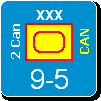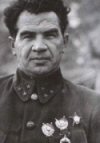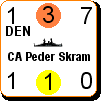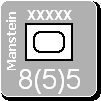marcuswatney
Posts: 279
Joined: 2/28/2006
Status: offline

|
Phantom's official name was the GHQ Liaison Regiment, and you can read about it here: http://en.wikipedia.org/wiki/GHQ_Liaison_Regiment . There is an article about the radios here http://www.vmarsmanuals.co.uk/newsletter_articles/phantomsignals.pdf .
In 1942, my father was exhausted towards the end of a long marching exercise when a friend drew alongside him in an armoured car and said: "I'll be in the mess in 20 minutes: see you there later." There and then, my father decided that if he was going to go to war at all, he would rather do so sitting-down. So he got his friend to organise a transfer for him into Phantom.
Phantom was one of Britain's private armies. It took orders only from the generals back at GHQ, and was not obliged to follow the orders of any field commander it was not attached to. Its purpose quite simply was to be the eyes and ears of those generals, so they could have up-to-the-minute information. For example, on one occasion in Normandy my father was ordered to discover exactly who controlled a particular hill. He went on to that hill, and was promptly shelled by both sides, revealing that both believed the hill was controlled by the enemy, and that in fact nobody controlled it!
The patrols were very small (typically nine to fifteen men) centred around a radio truck with a transmitter capable of reaching London from Normandy. There were jeeps, motorbikes and scout-cars. The scout-cars were armoured but unarmed, and had the novel feature of being able to go as fast backwards as forwards ... so they could get out of trouble as quickly as they got into it. However, my father told me that he much preferred to recconnoitre on a motorbike. He said the most dangerous moment was when you returned to friendly lines. If you were on a motorbike you were non-threatening, and troops were likely to hold their fire until they had identified you ... whereas if you roared round a corner in an armoured vehicle they'd shoot first and ask questions later.
Phantom was also incredibly effective at destroying Tigers. The great problem with the Tiger was that it had a noisy engine that had to be warmed up in the mornings before it could move. Two Phantom patrols a few miles apart would each take a bearing on the revving engines, send those bearings straight back to London, who would use triangulation to determine the location of the tanks and immediately send fighter-bombers into the attack. The Germans never worked out how it was their Tigers kept being destroyed before they had even advanced to the front-line.
My father was scheduled to land on D-day at 11pm on Mike Red, but delays at sea meant they went in on the morning of D+1. While waiting out at sea, he logged the very first radio message to come out of Normandy, from 6th Airborne, timed at 0740: "Have captured intact both bridges. Report HQ 2 Battalion 125 Panzer Grenadier Regiment at Collombelles. All informed."
My father fought in Normandy for six weeks. Then in the early hours of 18 July he was severely wounded by Luftwaffe dive-bombers. He said the medical services were outstanding: he was back in England within 24 hours. That's why he missed the jaunt to Copenhagen.
On 2 May 1945, 6 Airborne Division reached the Baltic, cutting Denmark off from Germany. They met the Russians the next day. But the Btitish were suspicious of Soviet intentions, especially given the way Denmark controls access to the Baltic. The Soviets were already sniffing around Bornholm. The Germans in Denmark wanted to surrender to the Western Allies and were fearful of the Soviets. The trouble is that the rules of war say that you can only surrender a formation to an enemy officer. You cannot surrender your command to partisans (not least because, under the Geneva Convention, the capturing power immediately becomes responsible for the welfare of the prisoners).
So a close friend of my father, probably John Sadoine, Ronald Stanton or Micky Masters, was given the extraordinary order to drive as rapidly as possible, stopping for no-one, all the way to Copenhagen and there to accept the German surrender, thus liberating Denmark in the name of the Western Allies. If he hadn't been wounded, it would have been my father, so, being half-Danish, he was a little disappointed.
If anyone is interested in this unusual unit, you can read more about D-Day in my father's book The Enemy Wiithin by John Watney (Hodder & Stoughton, 1946). Kingsley Amis told my father privately that it was the best book to come out of the war, which was rather nice of him.
|
 Printable Version
Printable Version




















 New Messages
New Messages No New Messages
No New Messages Hot Topic w/ New Messages
Hot Topic w/ New Messages Hot Topic w/o New Messages
Hot Topic w/o New Messages Locked w/ New Messages
Locked w/ New Messages Locked w/o New Messages
Locked w/o New Messages Post New Thread
Post New Thread